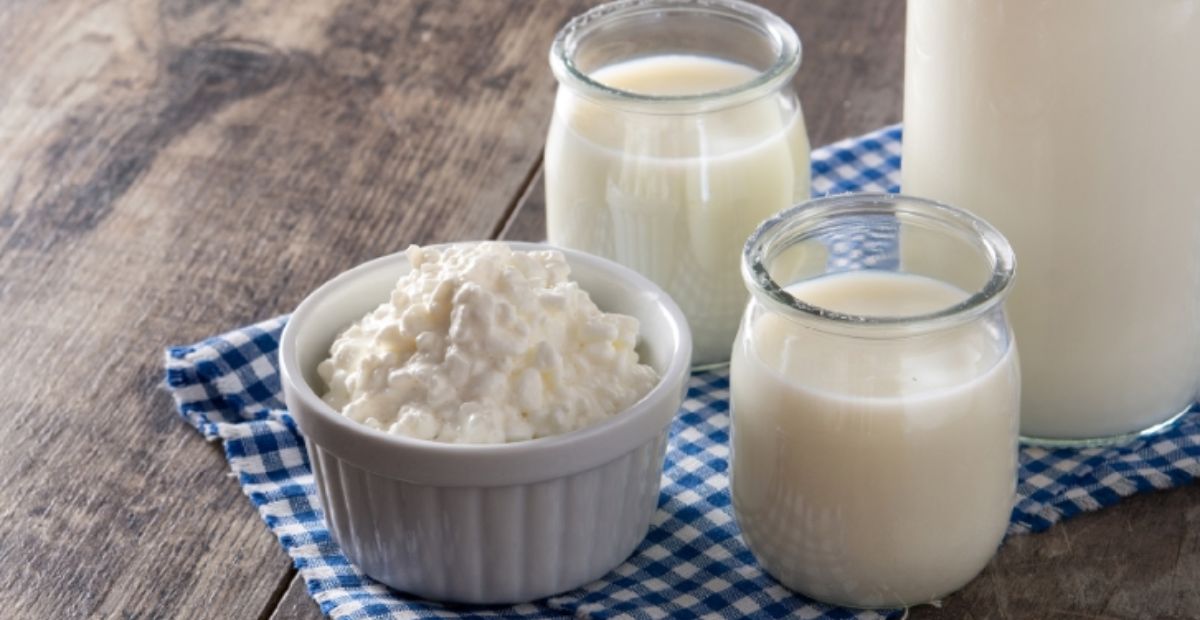Originating from the ancient Caucasus Mountains, this fermented drink isn’t just flavorful; it’s a potent potion packed with vital nutrients. There are many health benefits of Kefir milk and we will explain them in this article. Beyond its tangy taste and creamy texture, kefir milk offers a remarkable list of benefits that can greatly boost your well-being. Let’s explore the benefits of adding kefir milk to your diet. But, before this, let us tell you what Kefir Milk is and how you make it at home.
In This Article
What Is Kefir Milk?
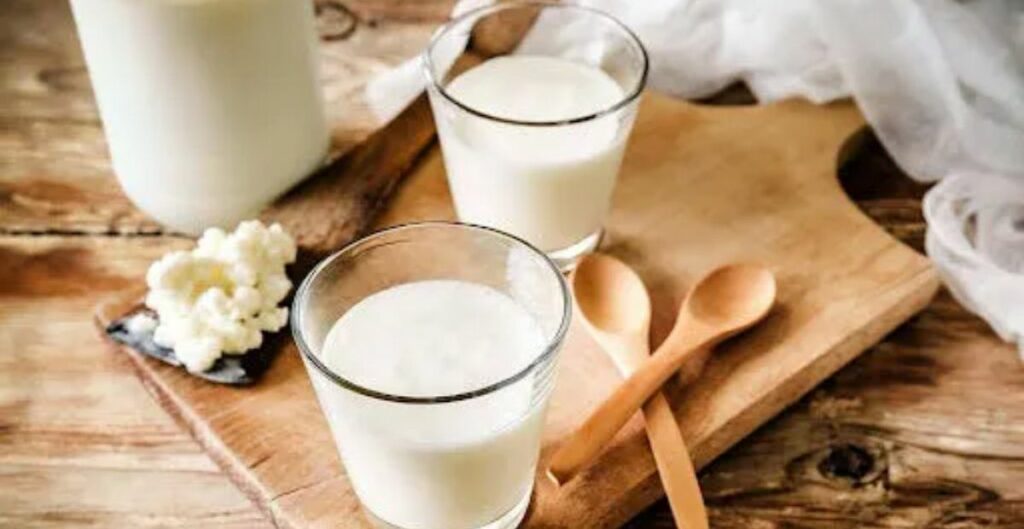
Kefir milk, an ancient fermented drink, originates in the mountainous areas of the Caucasus. It’s highly valued there for its representation of the vigor and health benefits of Kefir Milk. The special aspect of kefir lies in how it’s made, using kefir grains—these are a complex mix of bacteria and yeast.
Like small cauliflowers, these grain-like structures work by fermenting various kinds of milk, such as cow, goat, sheep, or even non-dairy options like coconut or almond milk. During fermentation, the milk gains a tangy taste and a unique bubbly quality, turning it into a beverage packed with probiotics and nutrients.
Kefir is appealing not just because it tastes great but also because it’s adaptable and offers the health benefits of Kefir Milk. Its mix of helpful bacteria, yeasts, and enzymes sets it apart from other fermented dairy products. This mix makes it a powerhouse for good bacteria, known as probiotics, which are great for the gut and digestion.
Kefir can suit different diets, making it a go-to for people who are lactose intolerant or want non-dairy options without sacrificing taste or nutrition. Its tangy flavor and rich nutrients have made it very popular as a top-notch food choice among health-conscious people around the globe.
Across generations, families and communities cherished the art of making kefir, passing it on through stories rather than writings. Drinking became a special tradition, especially during celebrations, believed to support good health.
This admiration for its benefits spread beyond borders, gaining popularity globally as people recognized its nutritional value and probiotic qualities, appealing to health-conscious individuals worldwide.
Kefir’s evolution, from its start in the Caucasus Mountains to becoming a crucial part of the health benefits of Kefir Milk-oriented diets, reflects an incredible path blending tradition, scientific exploration, and the pursuit of overall well-being.
How You Can Make Kefir Milk At Home: Step-By-Step Process To Enjoy Health Benefits Of Kefir Milk
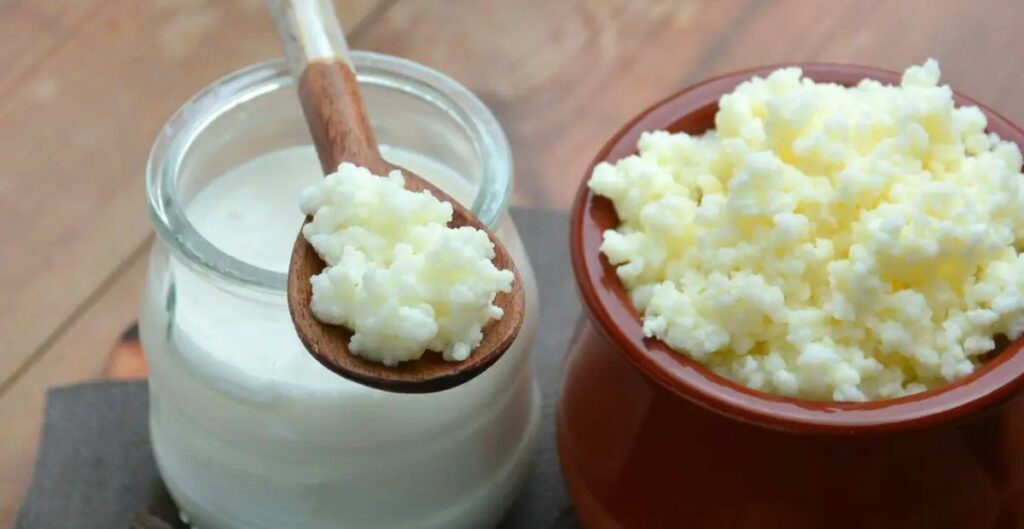
Kefir milk is a rich source of helpful bacteria and is highly valued among fermented drinks. It has a tangy, creamy taste and brings many health advantages while being adaptable in cooking. Creating kefir milk at home isn’t just about cooking; it’s a way to care for your health. You can explore the straightforward yet detailed steps to make this wonderful drink right in your kitchen.
Ingredients & Equipment
Here are the ingredients and equipment that you will need:
● Kefir Grains: The magical element behind kefir’s fermentation process, these unique grains resemble cauliflower florets and are a symbiotic culture of bacteria and yeast (SCOBY). Acquire kefir grains from a reliable source or through sharing from fellow enthusiasts.
● Milk (Dairy or Non-Dairy): The foundation of kefir, the choice of milk is pivotal. Whether dairy-based (cow, goat, or sheep milk) or non-dairy alternatives (coconut, almond, soy), ensure they are high-quality and free from additives.
● Glass Jar: A clean, transparent glass jar, preferably with a wide mouth, facilitates the fermentation process. Its transparency allows you to witness the transformation within.
● Breathable Cloth or Coffee Filter: Cover the jar with a breathable cloth or a coffee filter secured with a rubber band. This allows the kefir to breathe while preventing contamination.
Preparation
The preparation you’ll have to do:
● Activate Kefir Grains: Before starting the fermentation process, waking up dormant kefir grains is essential. To revive these amazing microorganisms, gently rinse them with lukewarm water, avoiding extreme temperatures that could damage their fragile structure.
After rinsing, put them in some fresh milk to give them the nourishment they need to become active. This activation phase accelerates their metabolism, preparing them to turn milk into a delightful kefir drink.
● Choose Milk: The health benefits of Kefir Milk extend beyond its delightful taste and texture. Different kinds of milk play a pivotal role in enhancing these benefits and shaping the final drink. Dairy milks like raw, pasteurized, or homogenized ones not only imbue the kefir with distinct levels of creaminess and tang but also contribute to the health benefits of Kefir Milk.
Non-dairy alternatives such as nut or oat milk introduce diverse textures and flavors, catering to individuals who cannot consume lactose or prefer plant-based choices. Exploring various types of milk not only allows for customization to suit personal preferences but also maximizes the health benefits of Kefir Milk in every batch, ensuring a deliciously nutritious experience.
● Sterilize Equipment: Setting up a clean space for fermentation is vital when making kefir. Before you begin, thoroughly clean all your tools—like glass jars, stirring spoons, and filters—with hot water to remove dirt or germs. Keeping everything sterile lowers the chances of bad bacteria or mold getting into your kefir, guaranteeing a healthy and tasty final drink.
Fermentation Process
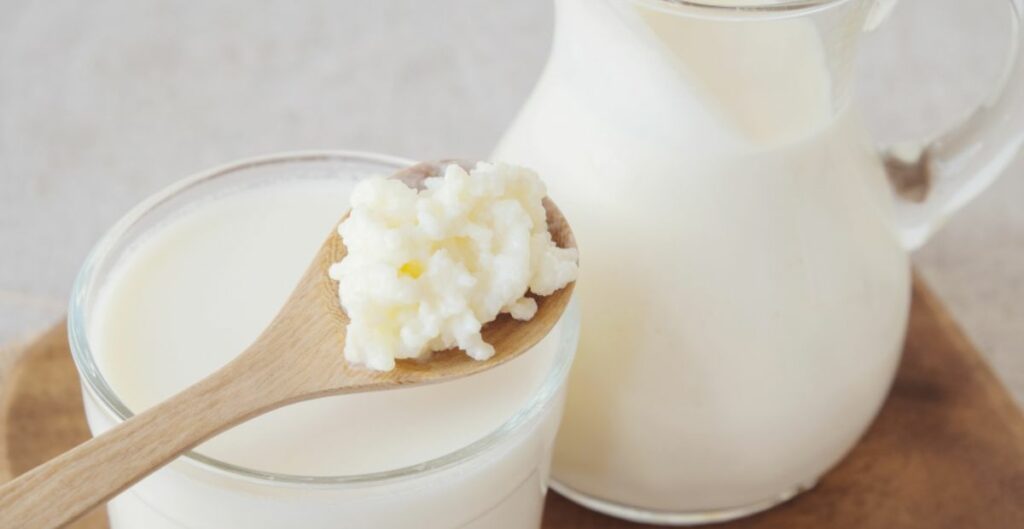
Now, here comes the fermentation process:
- Mixing: In the sanitized glass jar, combine the activated kefir grains with the chosen milk in a ratio of approximately one tablespoon of grains to one cup of milk. Gently stir the mixture.
- Covering: Securely cover the jar with a breathable cloth or coffee filter, ensuring it is tightly sealed with a rubber band. This allows air circulation while protecting the kefir from external contaminants.
- Fermentation: Place the jar in a warm, shaded spot away from direct sunlight. Allow the fermentation process to unfold, typically 24 to 48 hours, depending on ambient temperature and desired kefir consistency.
Straining & Storage
Here is what you should know about straining and storage:
- Straining: Once the fermentation period concludes, strain the kefir using a plastic sieve or non-metal filter, separating the creamy kefir from the grains.
- Grains Separation: Gently rinse the kefir grains with lukewarm water to prepare them for the next batch. Avoid using soap or hot water, which can harm the grains.
- Storage: Transfer the freshly strained kefir into a clean glass container and refrigerate to slow fermentation. Enjoy the kefir within a week for optimal taste and potency.
Tips & Considerations
Here are some tips and considerations:
- Consistency: Experiment with fermentation durations to achieve your desired consistency and flavor. Longer fermentation yields a tangier and thicker kefir.
- Kefir Grain Care: Ensure the health and vitality of kefir grains by regularly refreshing them with fresh milk and handling them with care during rinsing and storage.
- Adjusting Fermentation Time: Tailor the fermentation period based on environmental factors like temperature and humidity to achieve the desired taste and texture.
Throughout each step, from the lively interaction of kefir grains to the milk’s creamy change, this process showcases the beauty of fermentation. The outcome? A blend of helpful bacteria and a flavor turns something usual into something exceptional. Here’s to your homemade kefir milk—a tribute to patience, attention, and the pure delight of making something from scratch.
Unexpected Health Benefits Of Kefir Milk
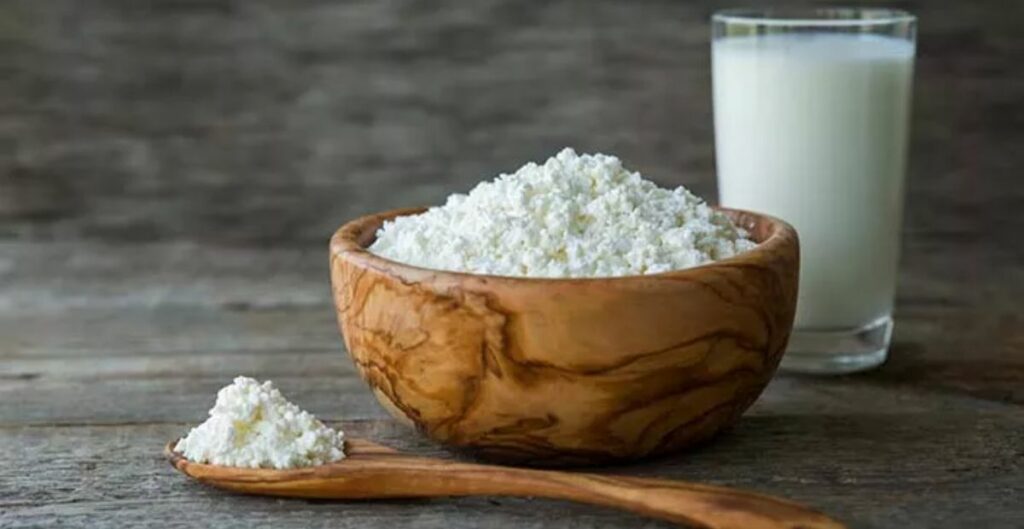
Throughout history, people have sought ways to improve their health through different foods. Among these options, kefir milk is a powerful and unexpectedly beneficial addition to your diet. This fermented drink, filled with probiotics, doesn’t just taste great—it also holds many surprising health benefits that might truly amaze you.
Enhanced Digestive Wellness
The gut plays a pivotal role in overall health, and understanding the health benefits of Kefir Milk is crucial for digestive well-being. Packed with probiotics—beneficial bacteria and yeasts—kefir is a powerhouse for gut health. These health benefits of Kefir Milk help maintain a balanced microbiome, which is crucial for effective digestion and nutrient absorption.
Beyond just aiding with lactose digestion, kefir’s probiotics create an environment where good bacteria thrive, potentially easing digestive issues like bloating and indigestion. Studies even suggest that consuming kefir might alleviate symptoms of irritable bowel syndrome (IBS) by supporting a healthier gut environment. Making kefir a regular part of your diet could lead to a more comfortable and efficient digestive system.
Additionally, kefir contributes to digestive health beyond its probiotics. This fermented milk contains enzymes that help break down food and improve nutrient absorption. Enzymes like lactase, amylase, and lipase support the body in effectively using nutrients from what you eat, showcasing the multifaceted health benefits of Kefir Milk by promoting enzyme activity, assisting digestion, and potentially benefiting overall metabolic function.
Boosted Immune System
The link between gut health and the immune system is gaining recognition, and kefir’s influence on immune function is significant. The plentiful probiotics in kefir are essential for strengthening the body’s defense. These live cultures help diversify and strengthen gut bacteria, vital for regulating the immune system.
Research indicates that a well-balanced gut, supported by regular kefir intake, might lower the risk of infections by boosting the immune response. Additionally, kefir’s anti-inflammatory traits could ease allergic reactions, further supporting a resilient immune system.
The health benefits of Kefir Milk regarding the immune system also involve reducing chronic inflammation, which is known to contribute to autoimmune diseases and metabolic disorders. The probiotics in kefir could help control the body’s inflammatory reactions, potentially reducing the chances of developing inflammation-related conditions.
By promoting a healthy gut environment, kefir aids the body’s natural defense mechanisms, ultimately improving overall immunity through the health benefits of Kefir Milk.
Improved Bone Health
Amidst its lesser-known benefits, kefir milk emerges as an unsung hero in fortifying bone health. Laden with calcium, kefir aids in maintaining optimal bone density, potentially reducing the risk of osteoporosis and fractures.
What sets kefir apart is its bioavailability – the calcium in kefir gets absorbed more efficiently than traditional dairy sources. Moreover, vitamin K2 in kefir further aids calcium absorption and utilization, promoting stronger and healthier bones.
Potential Weight Management Aid
In the pursuit of a healthier lifestyle, weight management often takes precedence. Interestingly, the health benefits of kefir milk emerge as a potential ally in this journey. Studies suggest that the probiotics present in kefir may influence metabolism and aid in weight regulation.
Additionally, the protein content in kefir fosters a feeling of fullness, potentially curbing cravings and overeating tendencies. Incorporating the health benefits of kefir milk into a balanced diet may support weight management efforts.
Elevated Mental Well-being
Beyond its physical health advantages, the health benefits of Kefir Milk also showcase potential benefits for mental wellness. The gut-brain connection is fascinating, and Kefir’s impact doesn’t merely stop at digestive health.
Emerging research indicates that a balanced gut microbiome, fostered by probiotics in Kefir, might positively influence mental health, contributing to the health benefits of Kefir Milk. Consumption of Kefir could potentially alleviate symptoms of anxiety and depression, promoting an overall sense of well-being attributed to the health benefits of Kefir Milk.
FAQs About Kefir Milk
Here are some frequently asked questions about Kefir Milk:
What makes Kefir Milk unique in comparison to regular milk?
Kefir milk has a unique origin and makeup that sets it apart from regular milk. Unlike typical milk, kefir milk is fermented using kefir grains, a mix of bacteria and yeast. This process gives kefir milk its tangy taste and a bit of fizziness, which regular milk doesn’t have. Moreover, because of the breakdown of lactose during fermentation, kefir milk can be easier to digest for many people, making it a potentially attractive option for those with lactose intolerance.
Are there different types of Kefir Milk?
Indeed, the world of kefir milk offers a diverse array of options, varying in taste, consistency, and even the source of milk. Traditional kefir milk is primarily made from cow’s milk, but enthusiasts also craft kefir from goat’s, sheep’s, or even plant-based alternatives like coconut milk or nut milk. Each variation introduces unique nuances in flavor and texture, catering to different preferences and dietary needs.
Does Kefir Milk contain probiotics?
Absolutely! Kefir milk is a hub of probiotics, housing a variety of helpful bacteria and yeast. These probiotics, such as Lactobacillus and Bifidobacterium strains, support gut health by fostering a balanced microbial setting. Drinking kefir milk regularly might help digestion, boost the immune system, and even ease certain digestive problems.
Is Kefir Milk safe for lactose-intolerant individuals?
Surprisingly, kefir milk can be a viable option for individuals with lactose intolerance. The fermentation process significantly reduces the lactose content in kefir milk, making it easier for many people with lactose intolerance to digest. However, individual tolerance levels vary, and some may still experience discomfort, so it’s advisable to start with small amounts to gauge personal tolerance.
Can Kefir Milk be used in cooking and recipes?
Certainly! Beyond its role as a standalone beverage, kefir milk lends itself wonderfully to various culinary applications. Its tangy profile and slightly thicker consistency make it a versatile ingredient in sweet and savory dishes. From smoothies and salad dressings to baked goods and marinades, kefir milk adds a delightful depth of flavor and a subtle tanginess to recipes, elevating the overall taste.
Is Kefir Milk suitable for individuals with specific dietary restrictions?
Kefir milk could be a helpful option for people with certain dietary limitations. For those on a gluten-free or low-lactose diet, kefir can be a nutritious substitute. Additionally, its probiotics can aid in balancing gut health, making it a suitable choice for various dietary preferences.
Conclusion
Incorporating kefir milk into your diet reveals a treasure trove of surprising health perks. It fortifies gut health, strengthens immunity, supports bone health, aids weight management, and even boosts mental well-being. This fermented drink is a remarkable addition that can elevate your overall health. Embrace the tangy delight of kefir and let its incredible benefits thrive in your daily routine, paving the way for a healthier and livelier you.
Read Also:

